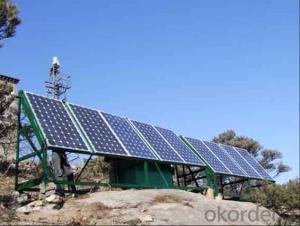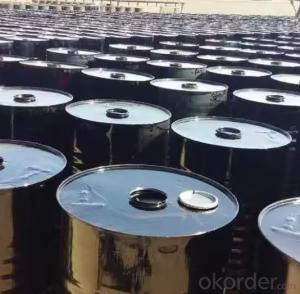Off-Grid Solar Power System 10KW High Efficiency
- Loading Port:
- China main port
- Payment Terms:
- TT OR LC
- Min Order Qty:
- 1 pc
- Supply Capability:
- 10000 pc/month
OKorder Service Pledge
OKorder Financial Service
You Might Also Like
1.Description of Product
Off-Grid Solar Power System is consisted of solar panel, solar charge controller, inverter, battery, mounting rack and cables.
(1).Grid-connected, send power to city grid
(2).MPPT technology, wide range of working voltage
(3).Simply Wiring, easy installation, customized design for your projects
(4).Low investment & long term feedback
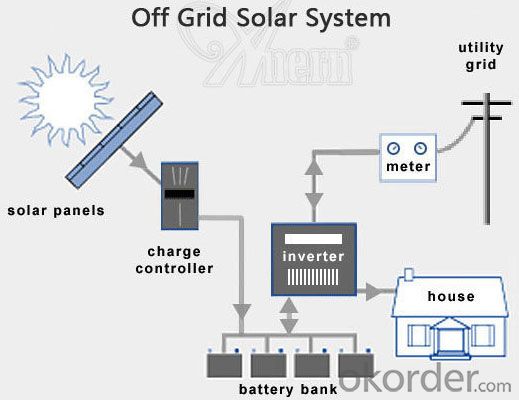
2. Off-Grid Features
1. Off grid solar power system is mainly used for application with relatively-small power consumption, and the areas have no grid network coverage, or grid power is unstable or outage condition.
2. It’s composed of solar panels, hybrid solar inverter, battery bank, solar panel mounting racks, and other accessories required fora complete home solar power system.
3. The battery bank gives a stable power output to the solar inverter which converts DC to AC to power loads, and provides power backup in rainy or cloudy days.
4. The solar panels generate electricity at daytime and charge the battery bank .
5. The off grid home solar power system provides grid power bypass in case of battery power shortage when sunshine is not enough.
6. All the off grid home solar power system configurations are worked out by scientific calculation and design.
The Product Parameter | |
Ref No. | 10KW |
Solar Panel | Type: Monocrystalline Silicon PV Module Max Power: 250W QTY:20 pcs |
Controller-Inverter Integrator | Rated Ouput Power: 7000W Rated DC Voltage: 96V QTY:1 pcs |
Battery | 12V/200AH per piece QTY:16 pcs |
Solar Panel Rack | Roof type mounting rack, anodized aluminum material, including complete fittings (Other type of racks can be customized as per client's requirement) QTY:1 pcs |
Cables | International standard, with specification suitable for solar system, BVV1*10 QTY:100m |
3.The Pictures of Product
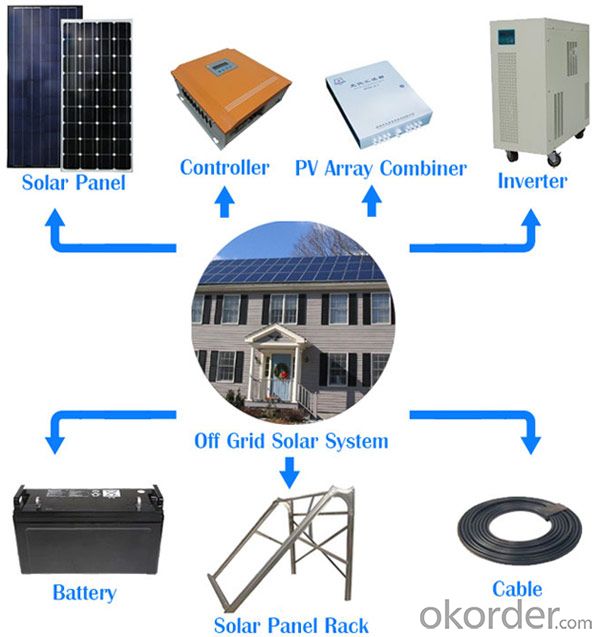
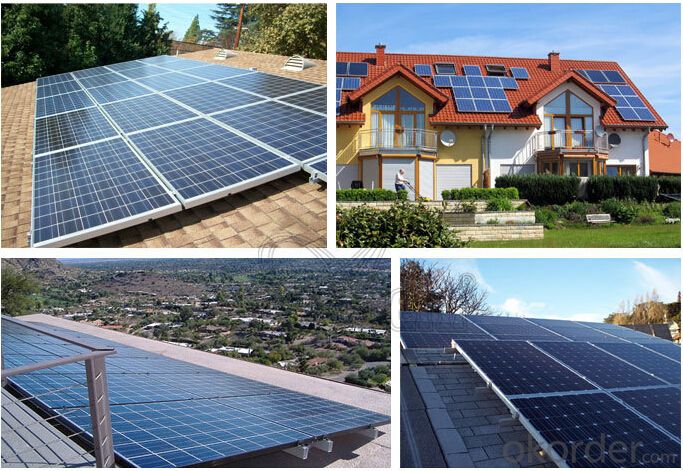
4.FAQ
Q1: What is the business type for the company?
A1: We are one of the biggest manufacturers inBejing.Chnia. Which is a high tech PV enterprise dedicated to the research, development, production and sales..
Q2: How long solar panel warranty can you offer?
A2: 10-Year product warranty,25-year linear power output warranty
If there is any quality problem, we will pay for freight and send free parts to you.
Q3: How many certificates do you have?
A3: We have 16 certificates,such as CE, TUV, UL, and so on.
Q4: Can I be the agent for you?
A4: Yes,We can discuss some information.
Q5: How to get a sample?How can cooperation with us
A5: contact us now.
- Q:Can solar energy systems be used in areas with limited access to solar energy incentives and rebates?
- Yes, solar energy systems can still be used in areas with limited access to solar energy incentives and rebates. While incentives and rebates can make solar installations more affordable, the feasibility of solar energy systems depends on factors such as the availability of sunlight and the cost of traditional energy sources. In areas with limited solar incentives, the decision to install solar panels should be based on factors like long-term cost savings, energy independence, and environmental benefits. Additionally, advancements in solar technology and decreasing costs make solar energy a viable option even without incentives.
- Q:Can solar energy systems be used for powering electric vehicle showrooms?
- Yes, solar energy systems can certainly be used for powering electric vehicle showrooms. Solar energy is a clean and renewable source of power that can provide electricity to a wide range of applications, including commercial buildings like showrooms. By installing solar panels on the roof or surrounding areas of the showroom, the energy generated from the sun can be converted into electricity and used to power the showroom's operations, including lighting, air conditioning, charging stations, and other electrical equipment. This not only reduces the reliance on grid electricity but also helps in reducing carbon emissions and promoting sustainability. Additionally, solar energy systems can also provide a cost-effective solution in the long run, as they help in reducing or eliminating electricity bills while providing a reliable and consistent source of power.
- Q:Can solar energy systems be used for heating and cooling a home?
- Yes, solar energy systems can be used for heating and cooling a home. Solar panels can harness the sun's energy to generate electricity, which can then be used to power heating and cooling systems such as solar water heaters and air conditioners. Additionally, passive solar design principles can be incorporated into the architectural design of a home to maximize natural heating and cooling through strategic placement of windows, insulation, and thermal mass.
- Q:Can solar energy systems be used for powering electric bike charging stations?
- Yes, solar energy systems can be used to power electric bike charging stations. Solar panels can be installed on the roofs or in the vicinity of the charging stations to capture sunlight and convert it into electricity. This renewable energy can then be used to charge the electric bike batteries. By utilizing solar power, electric bike charging stations can operate independently from the electric grid, reducing reliance on fossil fuels and lowering carbon emissions. Additionally, solar energy systems can provide a cost-effective and sustainable solution for powering electric bike charging infrastructure.
- Q:How do solar energy systems affect the insurance premiums of a property?
- Solar energy systems can have both positive and negative effects on insurance premiums for a property. On one hand, installing solar panels can increase the value of a property, which may result in higher insurance premiums. Additionally, the cost of replacing or repairing solar panels in case of damage or theft can also contribute to higher premiums. On the other hand, some insurance companies offer discounts or incentives for properties with solar energy systems due to their reduced reliance on traditional energy sources and lower environmental impact. Ultimately, the impact on insurance premiums will vary depending on the insurance company and specific circumstances of the property.
- Q:How do solar energy systems impact the insurance coverage of a home?
- Solar energy systems can impact the insurance coverage of a home in a few ways. Firstly, the installation of solar panels may increase the overall value of the home, which may lead to higher insurance premiums. Additionally, the presence of solar panels on the roof can increase the risk of damage or theft, so homeowners may need to ensure they have adequate coverage for these potential risks. However, some insurance providers offer specific policies or endorsements to cover solar panels, which can help protect homeowners from any potential losses or damages associated with their solar energy system.
- Q:Are there any safety certifications required for solar energy systems?
- Yes, there are safety certifications required for solar energy systems. In most countries, solar energy systems must meet certain safety standards and regulations before they can be installed and used. These certifications ensure that the solar panels, inverters, and other components of the system are manufactured and installed in a way that minimizes the risk of electrical hazards, fire, and other safety issues. One of the most common safety certifications for solar energy systems is the International Electrotechnical Commission (IEC) 61730 standard. This certification ensures that the solar panels meet specific safety requirements, including mechanical strength, resistance to environmental factors, and electrical insulation. It also includes tests for fire resistance, which is crucial to prevent potential hazards. Additionally, solar inverters, which convert the direct current (DC) generated by solar panels into the alternating current (AC) used in homes and businesses, also require safety certifications. The most widely recognized certification for inverters is the IEC 62109 standard, which verifies that the inverters meet safety requirements such as electrical insulation, protection against overvoltage and overcurrent, and proper grounding. Furthermore, the installation of solar energy systems must comply with local electrical and building codes, which often include safety requirements. These codes ensure that the system is installed correctly and safely, with proper wiring, grounding, and protection against electrical faults. It's important for solar energy system manufacturers, installers, and users to adhere to these safety certifications and regulations to ensure the safe and reliable operation of solar energy systems. By doing so, the risk of electrical accidents, fires, and other safety hazards can be minimized, providing peace of mind to both the system owners and the surrounding community.
- Q:How do solar energy systems impact the electricity grid?
- Solar energy systems impact the electricity grid by reducing the demand for electricity from traditional power plants and lowering overall electricity costs. They also contribute to a more resilient and decentralized grid by generating electricity closer to where it is consumed, reducing transmission losses and enhancing grid stability. However, the intermittent nature of solar power can pose challenges for grid operators in terms of managing fluctuations in supply and demand.
- Q:Can a solar energy system be installed on a concrete roof?
- Certainly! Solar energy systems can indeed be installed on concrete roofs. Concrete roofs are actually considered one of the best surfaces for installing solar panels. They are usually flat, stable, and long-lasting, making them an excellent base for the panels. Moreover, concrete roofs often have plenty of space and are not hindered by nearby trees or buildings, which allows for optimal sunlight exposure. To install the panels on a concrete roof, special mounting systems are used to securely attach them and withstand their weight. All in all, concrete roofs are a superb option for installing a solar energy system.
- Q:How do solar energy systems impact wildlife habitats?
- Solar energy systems can have both positive and negative impacts on wildlife habitats. On the positive side, these systems do not emit greenhouse gases, reducing air pollution and mitigating climate change, which can benefit wildlife in the long run. Moreover, solar panels can be installed on rooftops or in non-intrusive areas, minimizing disturbance to wildlife habitats. However, large-scale solar projects can disrupt ecosystems by clearing land or displacing wildlife. Therefore, careful planning and implementation of solar energy systems are crucial to minimize negative impacts on wildlife habitats.
1. Manufacturer Overview |
|
|---|---|
| Location | |
| Year Established | |
| Annual Output Value | |
| Main Markets | |
| Company Certifications | |
2. Manufacturer Certificates |
|
|---|---|
| a) Certification Name | |
| Range | |
| Reference | |
| Validity Period | |
3. Manufacturer Capability |
|
|---|---|
| a)Trade Capacity | |
| Nearest Port | |
| Export Percentage | |
| No.of Employees in Trade Department | |
| Language Spoken: | |
| b)Factory Information | |
| Factory Size: | |
| No. of Production Lines | |
| Contract Manufacturing | |
| Product Price Range | |
Send your message to us
Off-Grid Solar Power System 10KW High Efficiency
- Loading Port:
- China main port
- Payment Terms:
- TT OR LC
- Min Order Qty:
- 1 pc
- Supply Capability:
- 10000 pc/month
OKorder Service Pledge
OKorder Financial Service
Similar products
New products
Hot products
Hot Searches
Related keywords
